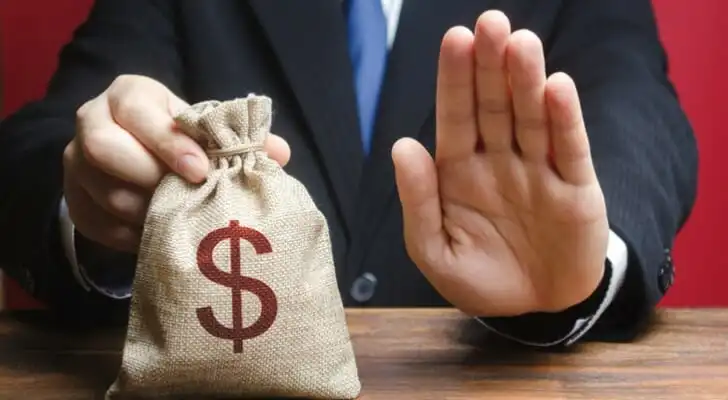Need to cancel a check that you’ve written after it’s been sent out? Depending on how much time has passed, you may be able to request a stop payment from your bank or credit union. Stopping payment can prevent the check from being cashed, though you might pay a fee for this service. The process to stop payment on a check and its costs depend on where you bank.
If you want to maximize your earnings through an investment, checking or savings account, consider working with a financial advisor.
What Is a Stop Payment?
A stop payment is a request to have your bank or credit union cancel a payment before it’s completed. Depending on where you bank, you might be able to request a stop payment on a check or ACH transfers. For example, you might schedule a bill payment in mobile banking, then decide you need to cancel it later.
There are, however, some transactions that you can’t stop payment on. If you’re sending money to another person or business via wire transfer, there’s usually no way to recall it. Banks typically don’t allow stop payments on cashier’s checks, either.
A cashier’s check is a check that’s drawn on the bank’s funds, not your own. When you purchase a cashier’s check, the bank deducts the money from your account and deposits it into its own account. The bank then issues the check using its account, so you’re unable to stop the payment.
Likewise, you can’t issue a stop payment for a money order, either. Money orders require upfront payment at the time of issue. This means there’s no payment to stop because the transaction has already been completed. You can, however, request a replacement for a lost or stolen money order from the entity that issued it.
How Does a Stop Payment Work?
Stop payments work by allowing your bank or credit union to halt payment for a check or ACH transaction. You tell the bank which payment you want to stop, and the bank flags the payment so nothing is paid to the intended recipient.
Banks and credit unions may charge a stop payment fee for this service. Once the bank completes your request for a stop payment, it may remain in place for a set time period. You may have the option to renew a stop payment order prior to its expiration.
There are many reasons why you may need to make a stop payment on a check.
- You wrote a check but have insufficient funds in your account to cover it and want to avoid overdraft fees.
- You lost a check that you have written to someone else, and you don’t want anyone who finds it to be able to cash it.
- You want to withhold payment for goods or services that were not received or are otherwise in dispute.
- You suspect the payment request is fraudulent.
- You believe the payment was made in error (e.g., it was sent to the wrong person or business or an incorrect address).
Keep in mind that you don’t have to explain to your bank why you want to stop a payment. You just need to provide the correct information so the bank can track it down.
It’s important to note, however, that you may only have a limited window in which to successfully stop a payment. For example, if the recipient of the check deposits it at their bank after you submit a stop payment request, the check might still be cashed, and funds will be withdrawn from your account.
How to Stop Payment on a Check

Your options for stopping payments vary by bank, but may allow you to submit a stop payment request online, over the phone or in person at a branch.
If you’d like to stop payment on a check, the first step is to ensure the check hasn’t cleared your account already. You can log in to mobile banking to view your transaction history. If you don’t see the check, but want to confirm it hasn’t been deposited or cashed yet, you can call your bank to verify.
The next step is to request the stop payment. To do that, you’ll need to tell the bank as much information as possible, including:
- Recipient’s name
- Check number
- Check amount
- Date of the check
- The account number the check draws from
Your bank may also ask you to verify your identity by providing the last four digits of your Social Security number or date of birth.
At the time you submit your request, the bank will tell you what bank fees, if any, apply. The bank may also caution you that a stop payment request order does not guarantee the payment will be blocked.
When Should You Consider Using a Stop Payment?
A stop payment can be useful if you realize you need to cancel a check before it’s cashed or deposited. This might happen if you lost a check, accidentally wrote it for the wrong amount or sent it to the wrong person. Stopping payment can help you avoid having money taken out of your account for a payment you no longer want to make.
You may also want to use a stop payment if you’re in a dispute with someone over goods or services. For example, if you paid a contractor with a check, but they didn’t complete the work, you might stop payment while the issue gets resolved. This can help protect your money while you figure out the next steps.
Another reason to use a stop payment is if you suspect fraud. If you think someone is trying to cash a check you didn’t approve or a check was stolen, a stop payment can block it before the money leaves your account. It’s important to act quickly since a stop payment won’t work if the check has already been cashed or deposited.
Can Someone Cash a Check That Has a Stop Payment?
Stop payments are intended to prevent a check from being cashed or deposited into someone else’s account. If someone attempts to cash a check that has a stop payment order in place, their request may be denied. In that case, they wouldn’t be able to cash the check. It’s an extra reassurance if you lose a check and someone finds it.
Once a check has been cashed, however, a stop payment order would have no effect whatsoever. That’s why it’s so important to act quickly if you find yourself in a situation where you need to cancel a check. Otherwise, the money could still come out of your account.
Is It Worth It to Put a Stop Payment on a Check?
It could be worth the trouble of issuing a stop payment order and paying bank fees if you have an urgent need to cancel a check.
For example, say you need to replace your roof. You hire a contractor who asks for a $5,000 deposit upfront. You write them a check in good faith, only to later learn from your next-door neighbor that the contractor has a reputation for scamming customers. In that case, it would be worth it to cancel the check and look for a new contractor. Paying $15 or $30 for a stop payment fee does not seem so bad when compared to the loss of $5,000 to a fraudulent contractor.
If you are able to contact the payee, it may not be worth stopping payment on a check when you can just ask them not to cash or deposit it. Depending on what the check was for, the recipient may be willing to hold off on cashing the check, sparing you the trouble of having to request a stop payment and pay a fee to the bank.
Bottom Line

Stop payments can come in handy if you need to cancel a check or ACH payment on short notice. The timing is the most important consideration, however. You should always request a stop payment sooner rather than later if you think you might need one. The longer you wait, the less likely you are to be able to stop payment on any check because it may have already been processed. Consider working with a financial advisor who can help you manage your money and grow your earnings while limiting risk.
Tips for Banking
- Consider talking to your financial advisor about the best ways to manage your checking account and minimize banking fees. Finding a financial advisor doesn’t have to be hard. SmartAsset’s free tool matches you with vetted financial advisors who serve your area. You can have a free introductory call with your advisor matches to decide which one you feel is right for you. If you’re ready to find an advisor who can help you achieve your financial goals, get started now.
- When comparing the best checking accounts, it’s helpful to look at the fees you might pay, including fees for stop payments. Many banks and credit unions charge these fees. And they may cost you anywhere from $10 to $30, depending on where you keep your money. It may be possible to avoid stop payment fees with online checking accounts or premium checking accounts at traditional banks.
Photo credit: ©iStock.com/bojanstory, ©iStock.com/Hispanolistic, ©iStock.com/Andrii Yalanskyi
